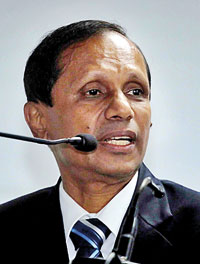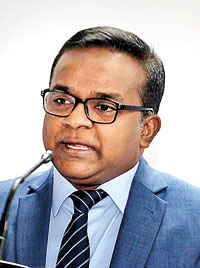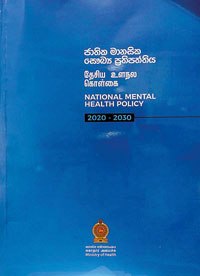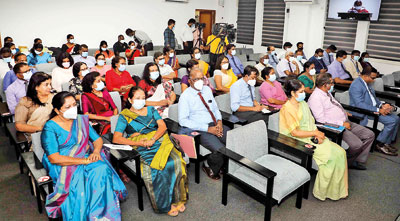News
Give us our own funds, says Director
View(s):
Those at the head table at the launch ceremony (from left) Dr. Sunil de Alwis, Minister Keheliya Rambukwella, Health Secretary Janaka Sri Chandraguptha, Dr. Lakshmi Somatunga, Dr. Alaka Singh and Dr. Rohan Ratnayake
- Wide-ranging National Mental Health Policy 2020-2030 launched on Tuesday
By Kumudini Hettiarachchi
Amid the joy of giving birth to it after much labour, a fervent plea went out from the Health Ministry’s Director of the Directorate of Mental Health, Dr. Rohan Ratnayake for a permanent fund allocation. Presently, the directorate is getting podda-podda (a little) from the ministry’s NCD Section (Non-Communicable Diseases Section).
He said that the directorate was supported by the World Health Organization (WHO) and the Primary Care System Strengthening Project (PSSP) being funded by the World Bank.
Another dire need for the mental health sector was Clinical Psychologists and Counsellors, he said.

Dr. Rohan Ratnayake
Dr. Ratnayake explained that mental health is more than the absence of mental illness. It is a state of mind where a person realizes his/her own abilities, can cope with the normal stresses of life, can work/study productively and fruitfully and is able to make a contribution to his/her community.
Underscoring the importance of human rights (HRs), he said that unless “we preserve and protect HRs we cannot think of mental well-being”. This is why the mission of the policy is to: “Establish an enabling environment for the enhancement of mental health and well-being for all, through mental health promotion, prevention of mental health conditions, treatment and rehabilitation, psychosocial care and protection and promotion of HRs.”
Contrasting this policy to what was in existence from 2005 to 2015, Dr. Ratnayake said this gives prominence to the prevention of mental health disorders and stigma and promotion of mental health; stresses the need for social inclusion; provides for correctional mental health, mental health in emergencies/disasters & forensic psychiatry; and crucially makes provision for steering and monitoring mechanisms.
Dr. Ratnayake said that under the new policy the proposed management structure is:
- The National Mental Health Advisory Council (NMHAC) – the main advisory body chaired by the Secretary of Health
- The National Committee of Mental Health (NCMH) chaired by the Director-General of Health Services (DGHS) which would provide administrative and technical guidance for the implementation of the policy
- The Provincial Mental Health Committees (PMHCs) chaired by the respective Provincial Director of Health Services (PDHS) and securing technical leadership from the Consultant Psychiatrists
- The District Mental Health Committees (DMHCs) chaired by the respective Regional Director of Health Services (RDHS)

Dr. Kapila Ranasinghe
“While the Directorate of Mental Health will play a pivotal role, the National Institute of Mental Health (NIMH) and all mental health preventive, curative and rehabilitative institutions, non-health governmental institutions and non-governmental organizations (NGOs) will work in tandem with the PMHCs and DMHCs,” he pointed out.
Under the policy, day centres for those with mental health issues are to be established at all hospitals categorized as Base or District General Hospitals. Medium-stay mental health rehabilitation units are planned for each district and long-stay residential facilities in each province for those with severe mental illness and residual disability who are unable to live independently and do not have carers.
Community Support Centres for prevention of mental health issues and promotion of mental well-being are to be set up in each Medical Officer of Health (MOH) area covering the grassroots.
Meanwhile, the policy envisages centres similar to the Alcohol Rehabilitation Centres in the Kilinochchi and Kegalle districts and the Drug Rehabilitation Centre in the Gampaha district, in other districts.
It also proposes the setting up of one central high-secure unit at the NIMH and five medium-secure units for minor offenders at selected tertiary care hospitals under forensic psychiatry.

The National Mental Health Policy 2020-2030
Forensic psychiatry, the Sunday Times learns, relates to basic research into the nature of the relationship between an offender and his/her mental state and the practical aspects of the progress through courts and treatment of an offender with a mental disorder.
“Everyone you meet is fighting a battle you know nothing about. Be kind always. For mental health is a right of the people,” added Dr. Ratnayake.
The launch of the policy took place at a hybrid meeting, both physical and digital. The physical meeting was attended by Health Minister Keheliya Rambukwella; ministry officials including Secretary Janaka Sri Chandraguptha; Additional Secretary (Public Health Services) Dr. Lakshmi Somatunga; Additional Secretary (Medical Services), Dr. Sunil de Alwis; and Deputy Director General (NCD), Dr. Champika Wickramasinghe; WHO Representative in Sri Lanka, Dr. Alaka Singh; and representatives of the Sri Lanka College of Psychiatrists including its President Dr. Kapila Ranasinghe.

Those who attended the physical meeting. Pix by M.A. Pushpa Kumara
| ‘Law should support policy’ Commending the launch of a comprehensive National Mental Health Policy, the President of the Sri Lanka College of Psychiatrists, Dr. Kapila Ranasinghe said that to cope with these unprecedented challenging times, what the country needs is a ‘Framework’ with two prongs. “Essentially, one prong is the National Mental Health Policy which addresses all issues and is the plan which provides guidance to the mental health service. But it is not the law. This is why the policy and its implementation have to be strongly supported by an adapted Mental Health Act. The current Act is over 100 years old and a newer draft has been at the Legal Draftsman’s Department for some time,” he said. Citing just one shortcoming in this obsolete Act, Dr. Ranasinghe said that it specifies that mentally ill patients may only be treated at the Angoda-locatedNational Institute of Mental Health (NIMH). So all those Psychiatrists who treat patients beyond the NIMH seek cover under the common law. This needs to change. “We also need a strategic plan for mental health,” he added.
| |
| Helpline 1926 now country-wideThe National Mental Health Helpline 1926 launched in October 2019 from within the National Institute of Mental Health (NIMH) to deal with issues after the Easter Sunday bomb blasts, was on Tuesday extended to all the districts in the country.The helpline will not only provide a ‘listening ear’ to all in need but also guide, with correct information, anyone who needs mental health support from the state hospital network in that person’s area. When Hotline 1926 was dialled from the podium of the Health Ministry auditorium soon after its countrywide launch, the call was picked up promptly. |
The best way to say that you found the home of your dreams is by finding it on Hitad.lk. We have listings for apartments for sale or rent in Sri Lanka, no matter what locale you're looking for! Whether you live in Colombo, Galle, Kandy, Matara, Jaffna and more - we've got them all!

